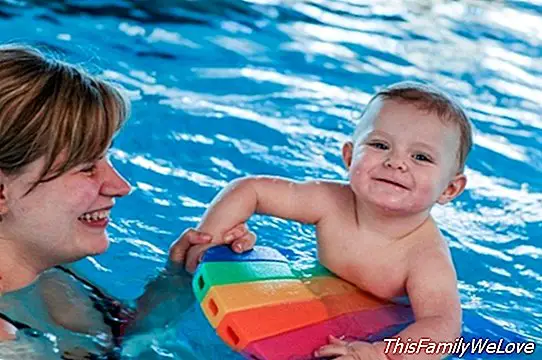Requirements of the pool for babies

It is recommended that you wait until the five or six months of life of the baby for Take your little one to the pool, since at this age he will have developed more his immune system. However, always remember that up to a year and a half you will not acquireutonomía in the water.
The fear of water is acquired as the child grows, but if your baby has not had any negative experience with the water while you have bathed, in principle, there is no reason for you to start your aquatic activity in a satisfactory way. As for swimming, Up to the age of 4, children are not prepared to learn to swim.
If you have decided that learn to float In a regulation school, it is highly recommended that at first you go with him in the pool to start your aquatic stimulation.
First of all, you will have to give your baby, through intense body contact, a feeling of security. Your hands must transmit confidence since, at the beginning, it is possible that it shows some discomfort for the new situation, but immediately you will feel comfortable and start kicking.
Requirements for the baby pool
It is highly recommended that the pool be covered and heated because the water temperature is more in line with your own and, of course, comply with all established sanitary and hygienic requirements.
1. Both the pool and the changing rooms must be air-conditioned and comply with the sanitary hygienic requirements established for these facilities.
2. The water chlorination level should be between 0.5 and 0.6 percent (compared to 1 percent in adult).
Good practices to go with your baby to the pool
1. Try to always hold the little one in your arms and take it to your chest and talk to it in a reassuring tone.
2. The technician or monitor -qualified specifically to work with children- will explain all the steps you must give in detail, but remember that the real teacher will be you, since the monitor will give you guidelines and recommendations for action.
3. It matters more than your child's experience in the water be pleasant, have fun to get the float, which will come a time later on its own. You should not obsess because your child learns survival techniques so as not to drown. You should always stay by his side and control him, since the main thing is that he begins to take pleasure in the water, and thus he will learn to swim.
4. If out of fear or any other reason you try to pressure your child To achieve short-term goals, the effects you get will probably be the opposite of what you are looking for. In addition, at these ages children perceive everything that surrounds them in a very intense way.
5. Always keep in mind that if your experience has been very traumatic in the water, this leaves sequels for the rest of his life.
D. Jesús Abiol.Director of BabyGym Chamartín (Madrid). Center specialist in aquatic activity of babies




